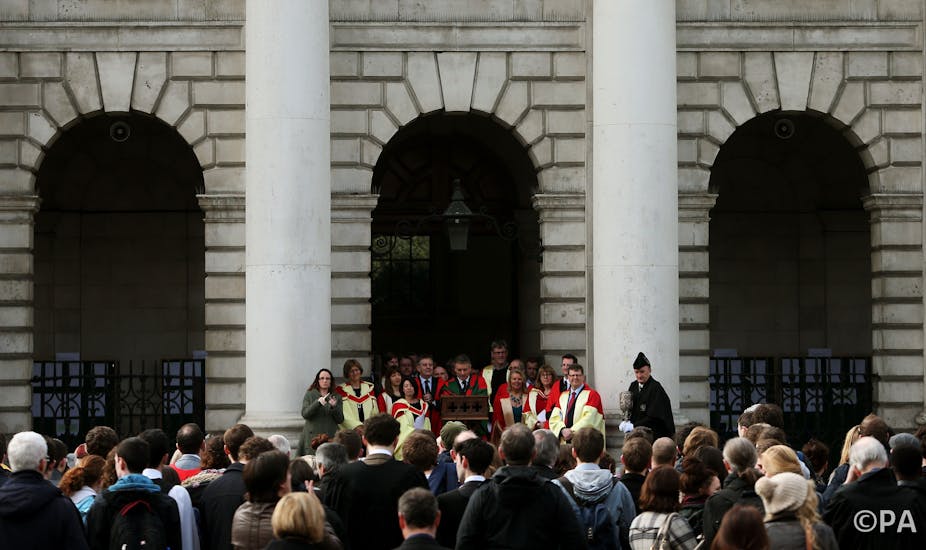As a young humanities scholar at the beginning of my PhD, my experience with the Irish postgraduate research funding system has left me disillusioned. So much so that I have joined the list of emigrants from Irish academia.
Being faced with three to five years of tuition fees for my doctoral study on media studies, I went in search of funding in Ireland. The fees differ according to university and course, but hover close to the €6,000 mark (£4,800) for my subject area. With the fees increasing every year, four years of enrolment would cost me more than €23,000.
Irish funding landscape
Ireland’s postgraduate funding system is made up of individual universities, commercial entities with vested interests, various state funding bodies – including government grants, and EU schemes. The application process in Irish universities is centralised in the Postgraduate Applications Centre.
Individual institutions do have postgraduate funding competitions at university, college, or departmental level – and these have to be applied for separately. But these competitions are very thin on the ground and often consist of a fees-only scholarship, rather than a full studentship including a maintenance stipend. Depending on the individual candidate’s circumstances, a fees-only scholarship might mean they will have to find employment and work long hours alongside their research. This is not an ideal situation for the creation of original knowledge.
The Irish Research Council (IRC) has been the main national funding research body since 2012, after two separate bodies were consolidated. Before then they dealt with separate disciplines – science, technology, engineering, and mathematics (STEM) on one side, and social sciences and humanities on the other. Now, it all comes out of one pot but is divided up into two streams.
Highly competitive
In the 2013 Government of Ireland Scholarship scheme, €17.9m was allocated through 247 awards with the majority for PhDs alongside some masters degrees, according to the IRC. Of this funding, 45% was for research in the humanities and social sciences and 55% in STEM. But the amount fell in the 2014 round, with the IRC awarding 219 postgraduate awards totalling €16.8m. This year the breakdown was 43% for the humanities, and 57% for STEM subjects.
The IRC declares non-bias towards disciplines: “The Council funds excellent researchers across all disciplines and encourages interdisciplinary research and engagement with enterprise.”
IRC’s annual doctoral funding competition, which currently includes a fees scholarship and €16,000 yearly stipend, is notoriously competitive. Throughout my application, I was told by both current PhD students and senior academic staff in Ireland that it is hardly worth applying for in my discipline. The process includes a stringent and ambiguous application form, which makes the task more difficult.
I asked the IRC to comment on these issues. They responded, emphasising their commitment to supporting excellent researchers across all disciplines through several highly competitive funding schemes, which are assessed by an “international panel of experts”.
EU funding no easier
At EU level, the Horizon 2020 research strategy is worth €80 billion to researchers across the member states between 2014 and 2020. A quick look at the current list of funding calls shows familiar demands to demonstrate quantifiability and potential commercial profit-making potential, which are perpetuated by so many funding bodies. This is to the detriment of numerous disciplines in the humanities and social sciences, which deal with less concrete, less economically quantifiable issues.
After nine months and more than 20 applications across the EU, I have been lucky enough to secure funding in a UK university. I will be able to concentrate fully on my doctoral research without worrying about working alongside to fund it. Too many young Irish scholars face this compromising situation.
Weakness in Irish system
Ireland is in a dire situation in comparison to the UK and other EU universities. I applied to more than ten UK universities that offered fully funded studentships across various humanities departments that corresponded to my research interests. On the continent, Germany offers free PhD study.
Of course, Ireland has a much smaller population than these countries and cannot offer every funding for every specialisation. Despite this, Ireland needs to look at its system of university financing for the sake of future generations of scholars. The figures since austerity policies have been implemented are distressing, with a 20% drop in public funding for higher education between 2008 and 2012 according to the European University Association.
Irish universities have begun to speak out about their lack of capacity to fund postgraduate and postdoctoral research. Some have become more vocal about this as their world rankings drop.
Humanities left aside
I am in a minority of the population pursuing higher education to doctoral level. And you may ask why should humanities researchers like me be supported? I answer that the academy is a special sector, which should not be measured according to economic criteria.
Innovation as commercial entrepreneurship should not be the ultimate yardstick. The social good fostered by the pursuit of human knowledge is immeasurable. The humanities have a special place in this scheme – a message that is increasingly being communicated to the general public.
Are young Irish scholars destined to work in a system that undermines them through precarious labour and casual contracts, reduced funding and inappropriate performance criteria? Are we destined to become, in a word, “para-academics”?
The emigration of Irish people, a special case in Western Europe, continues into academia. It doesn’t have to be this way. But the promotion of a vibrant research culture in Ireland is futile if scholars are being forced to emigrate or to change careers. To Ireland I have become another figure on the list of young emigrants.

